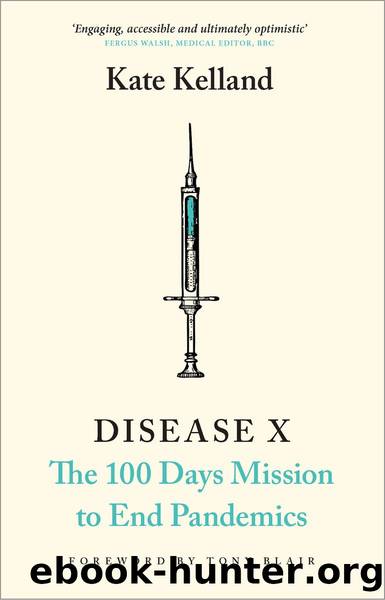Disease X by Kate Kelland;

Author:Kate Kelland;
Language: eng
Format: epub
Publisher: Lightning Source Inc. (Tier 1)
Published: 2023-06-15T00:00:00+00:00
NOTES
28 https://www.regjeringen.no/contentassets/d0b61f6e1d1b40d1bb92ff9d9b60793d/no/pdfs/nou202220220005000dddpdfs.pdf
29 https://www.bbc.co.uk/news/uk-politics-56361599
30 https://www.bbc.co.uk/news/uk-54182368
31 https://www.thetimes.co.uk/article/48-hours-in-september-when-ministers-and-scientists-split-over-covid-lockdown-vg5xbpsfx
6: PREPARE
to Fail
On 3rd February 2020, just as the SARS-CoV-2 virus that causes Covid-19 began its rapid, long and lethal global march, the United States National Institute of Allergy and Infectious Diseases â the scientific research institution led by the now world-famous Dr Anthony Fauci â issued a depressing but relatively little-noticed announcement.32 An expensive and long-running clinical trial involving more than 5,400 volunteers in South Africa to test the potential of a candidate vaccine against HIV, the human immunodeficiency virus that causes AIDS, had proved useless. It was time to call a halt to the $104 million study, the NIAID statement said. The trial, code-named HVTN 702 or Uhambo, had gotten peoplesâ hopes up. It had been built on some already promising evidence from another curiously-named trial â RV144 â that had been conducted among thousands of people in Thailand between 2003 and 2009 and had been the only trial thus far to appear to show that an HIV vaccine could at least create a partially protective immune response.
The vaccine being tested in the Uhambo trial was based on a live bird virus called canarypox â a virus that scientists have discovered can infect human cells without causing any disease. That ability made it a promising so-called vector virus for a vaccine â one that carries material into human cells that then induces them to make several key proteins of the HIV virus. The hope was that those proteins would in turn stimulate the immune system to recognise and defend the body against any future HIV infection. That hope faded fast, however. Four years in to the trial, the studyâs independent monitoring board unsealed some of the data collected from the 14 sites participating and found that the experimental shot was making no difference. The trial had been due to run for six years, until July 2022, but by early 2020, the board concluded that continuing it would be futile. âThereâs absolutely no evidence of efficacyâ was the blunt assessment made by Glenda Gray, an AIDS doctor, scientist and activist who co-led the study and is also president of the South African Medical Research Council. The number of people newly infected with HIV in the trialâs placebo control group was almost the same as the number in the group that had been given the experimental canarypox-vectored vaccine. The candidate vaccine had failed. And for AIDS vaccine researchers across the world, it was back to the drawing board. Again.
Again â because unfortunately the halting of the Uhambo trial was just the latest in a sorrowful string of failures that has characterised the search for a vaccine to prevent HIV. More than a decade earlier, in 2008, two separate trials of an experimental AIDS vaccine designed by the American pharmaceutical company Merck & Co and called MRK-Ad5 were also stopped after a mid-stage data analysis showed very worrying results. Merck is one of the most successful vaccine developers in the world and is behind eight of the 14 now routine vaccines currently recommended for children in the United States.
Download
This site does not store any files on its server. We only index and link to content provided by other sites. Please contact the content providers to delete copyright contents if any and email us, we'll remove relevant links or contents immediately.
| Administration & Medicine Economics | Allied Health Professions |
| Basic Sciences | Dentistry |
| History | Medical Informatics |
| Medicine | Nursing |
| Pharmacology | Psychology |
| Research | Veterinary Medicine |
Periodization Training for Sports by Tudor Bompa(7950)
Why We Sleep: Unlocking the Power of Sleep and Dreams by Matthew Walker(6398)
Paper Towns by Green John(4829)
The Immortal Life of Henrietta Lacks by Rebecca Skloot(4278)
The Sports Rules Book by Human Kinetics(4103)
Dynamic Alignment Through Imagery by Eric Franklin(3941)
ACSM's Complete Guide to Fitness & Health by ACSM(3837)
Kaplan MCAT Organic Chemistry Review: Created for MCAT 2015 (Kaplan Test Prep) by Kaplan(3819)
Introduction to Kinesiology by Shirl J. Hoffman(3637)
Livewired by David Eagleman(3551)
The River of Consciousness by Oliver Sacks(3434)
The Death of the Heart by Elizabeth Bowen(3360)
Alchemy and Alchemists by C. J. S. Thompson(3317)
Descartes' Error by Antonio Damasio(3175)
Bad Pharma by Ben Goldacre(3121)
The Emperor of All Maladies: A Biography of Cancer by Siddhartha Mukherjee(2948)
The Gene: An Intimate History by Siddhartha Mukherjee(2945)
The Fate of Rome: Climate, Disease, and the End of an Empire (The Princeton History of the Ancient World) by Kyle Harper(2896)
Kaplan MCAT Behavioral Sciences Review: Created for MCAT 2015 (Kaplan Test Prep) by Kaplan(2833)
